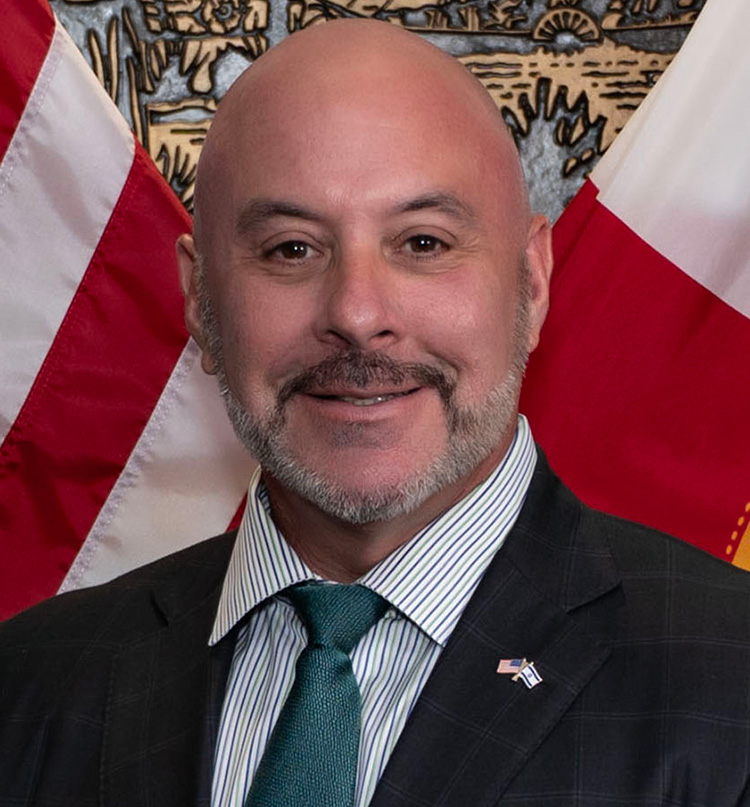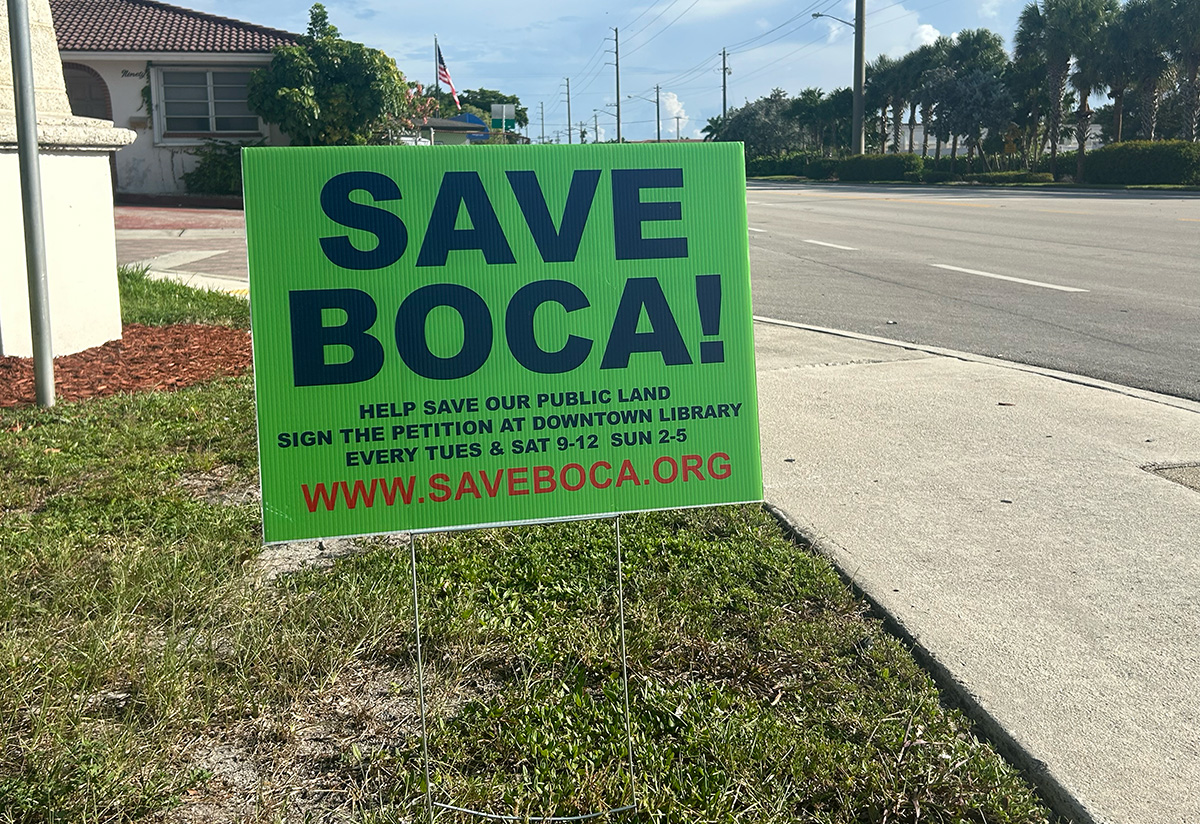Save Boca announced this week that the group had collected roughly 7,700 petition signatures for a proposed city charter change that would require a referendum on the sale or lease of at least one-half acre of public land. Save Boca started the campaign in opposition to the Terra/Frisbie plan to redevelop the 30 acres around City Hall.
Now what?
On Tuesday, the petition signatures were certified as sufficient by the city clerk’s office, which reviewed them for “compliance with the charter’s requirements as to form, content, and the number of valid signatures,” according to a city spokeswoman.
The signatures then went to the Palm Beach County Supervisor of Elections office, to verify the number of signatures and that the signers are registered voters within Boca Raton. The office is charging the city 10 cents per signature, a deeply subsidized rate.
The first batch has already been verified. Supervisor Wendy Link said reviewing the second batch of signatures will take longer. That’s because a new state law requires supervisors after Oct. 1 to prioritize petitions for constitutional amendments that would go on the 2026 state ballot. Link said the review process for those signatures is more complicated and takes longer.
At this point, such a delay would not seem to push verification past the point when the petition could get on the March 10 ballot. Link said her deadline for cities to notify the office of the lineup is Dec. 5, but there’s wiggle room. Sometimes, Link said, cities need to hold a second reading of ballot items that month, and the office obliges.
In addition to seeking the charter change, Save Boca has sought a similarly worded ordinance—essentially, a city rule—regarding public land. This week, the clerk’s office certified that Save Boca had gathered enough signatures from that first batch to put the ordinance before the city council.
Boca Raton council members can approve, reject or amend the ordinance. Whatever happens, Save Boca wants the charter change on the ballot. Any future council could rescind the ordinance. Only another referendum can undo a charter change.
On Monday, Save Boca founder Jonathan Pearlman accused the city of violating the charter to stall approval of the petition. From what I can see, however, the city is proceeding as it would with any other petition drive.
Also, during Monday’s city council workshop meeting, one speaker asked whether the March election could include early voting. Normally, that doesn’t happen, because city turnout is much smaller than for state primaries and general elections.
The speaker was implying that the strong opposition to Terra/Frisbie’s plan would draw many more voters than the polls could handle in one day. Recent history, though, does not seem to support that argument.
In 2021, with two council seats on the ballot, Boca Raton’s election drew about 13,000 voters—a fairly typical turnout. Even in 2018, when a special election for mayor went on the state primary ballot, turnout was roughly 18,000.
Then there’s the issue of cost. When Boca Raton held a one-day election in 2023, the city had to pay about $255,000. Each day of early voting could cost at least that much or more.
Link told me that she doesn’t have a current estimate. But early voting for the special election to fill the seat of State Rep. Joe Casello, whose district included Delray Beach, lasted eight days before today’s vote at all polling places. “I will have a good idea [on cost] when we finish that,” Link said.
The city council would have to request early voting. The council could specify the number of days. There has been no discussion outside of Monday’s meeting, but that could change.
Either way, March likely will feature the longest ballot in Boca Raton’s recent history. In addition to the Save Boca charter change, voters could decide on a version of the Terra/Frisbie plan. They also will choose a mayor and could elect as many as three council members. Finally, the city will ask voters to approve $175 million in bonds for a new police station by raising property taxes.
Boca Raton to approve 2025-2026 budget
Boca Raton and Delray Beach will have passed their budgets in very different ways.
The city council will give final approval tonight to Boca Raton’s spending plan for the fiscal year that begins Wednesday. As usual, city officials and council members are touting the fact that the tax rate didn’t go up. As usual, they gloss over the fact that residents will pay more overall because of higher property values, though the Save Our Homes amendment limits the increase in taxable value of primary residences to the rate of inflation or three percent, whichever is lower.
For 2025-2026, the general fund budget will be $254 million. The police and fire departments will make up $157 million of that total, followed by parks at $29 million and public works at $21 million. The city is adding three positions, notably a recreation supervisor and a planner to deal strictly with all development proposals under the state’s Live Local Act.
Notably, the new budget uses no money from the city’s reserves. Last year, the city took $14 million from those funds to balance the budget. Deputy City Manager James Zervis said the city cut nearly $10 million from preliminary department requests. Boca Raton will have 1,717 employees. The city also plans to invest $1.26 billion over the next five years in capital improvements, much of that on infrastructure.
Florida CFO claims waste in city budgets

For comparison, Boca Raton’s 2008-2009 budget was $168 million. I note that because Florida Chief Financial Officer Blaise Ingoglia, who is running for a full term next year, has been making strafing runs at local government to criticize what he claims are bloated budgets.
Ingoglia has based those claims on a comparison of budget increases and population increases. Cities have responded that such comparisons are misleading. For example, that 2008-2009 budget came during the worst of the Great Recession.
Still, Ingoglia and other Republicans are pushing for a constitutional amendment on next year’s ballot that would reduce or end property taxes. They are the main source of city and county revenue. The state gets no money from property taxes. The repercussions for local governments could be profound. I’ll have more on this soon.
Delray Beach mayor fights budget increase, tax hike
There was hardly any debate when Boca Raton approved its budget. The opposite was true in Delray Beach.
Going into this month’s required two public hearings, it was clear that a majority of the city commission— Commissioners Juli Casale, Rob Long and Thomas Markert—favored a slight increase in the tax rate and an increase in the general fund budget from $186 million to $201 million. It also was clear that a majority did not favor cutting the tax rate for property owners within the Downtown Development Agency boundaries.

None of that stopped Mayor Tom Carney from trying one last time to reduce each tax rate and spending. On Sept. 13, two days before those final hearings, Carney emailed an “Action Alert” seeking support for his positions.
At the hearing, Carney—sounding much like Ingoglia—began complaining about how the budget was out of whack compared to the rate of inflation. Markert quickly challenged him. Carney said, “You don’t want to debate me.” Markert said, “Bring it on.” He added, “You’re making it up, man.”
Carney also failed in his attempt to cut the DDA’s tax rate. Casale noted that the mayor’s criticism had produced the opposite effect. Rather than draw critics of the agency, it drew supporters—many of them property owners—who praised the DDA and argued against any spending cuts.
Carney had to give up the mayor’s gavel so he could make the motion to cut the tax rate. That meant Carney had to go on about something he knew would fail, after which Casale went on in response to Carney. Their ramblings needlessly prolonged a meeting with a foretold outcome.
I spoke with Carney Wednesday. He said, “When it comes to protecting the taxpayer, I don’t quit.” Carney added, “I was disappointed that I didn’t get more support.” He plans to “start earlier” next year, with a request for zero-based budgeting, rather than wish lists from department heads.
FAU Faculty Senate to discuss recent suspensions

I wrote Tuesday about the suspension of three Florida Atlantic University faculty members for social media activity related to the killing of Charlie Kirk. The topic will come up today during a meeting of the FAU Faculty Senate.
On the agenda are two resolutions. One, from the Advisory Council of Faculty Senates, “condemns the murder of Charlie Kirk as a reprehensible act of violence and an attack on the principles of free expression and lawful discourse.” It also “opposes any effort to suppress, punish or otherwise infringe upon our public universities’ communities lawfully protected exercise of free speech and expression.”
The other, from the Faculty Senate and the FAU chapter of United Faculty of Florida—the union—states that “public disclosure of personnel actions taken in response to public speech — when such disclosure lacks clearly articulated and specific grounds — has a chilling effect on the free expression of ideas within the university community.”
FAU President Adam Hasner went public with the first suspension. He will be at the meeting.







